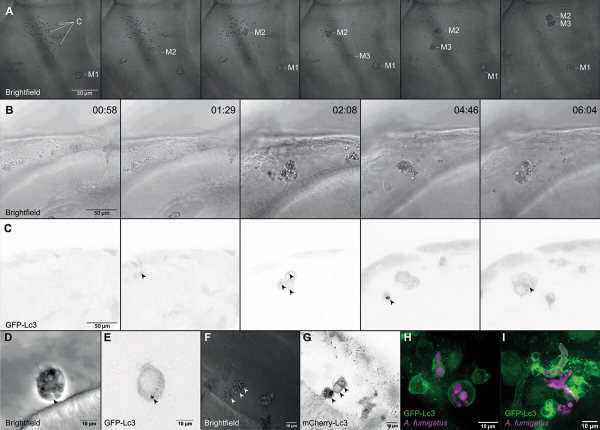![GFP-Lc3 dynamics in phagocytes after phagocytosing A. fumigatus conidia. (a) Representative sequence of events following injection of A. fumigatus conidia into the hindbrain of a zebrafish embryo. More than 100 A. fumigatus ∆Ku80 conidia are initially phagocytosed by the first 3 macrophages to arrive at the infection foci. Arrows indicate macrophage arrival and phagocytosis start. Images taken from Movie S1. (b and c) Confocal microscopy images showing the brightfield (b) or GFP-Lc3 fluorescence intensity (c) during the first 6 h and 30 min after infection. Most conidia are phagocytosed in the first 5 h post infection by a small number of phagocytes. Arrows indicate GFP-Lc3 levels in immune cells after phagocytosing A. fumigatus conidia, including individual GFP-Lc3 rings around the conidia. Images taken from Movie S2. (d and e) Brightfield (d) and GFP-Lc3 fluorescence intensity (e) of a macrophage with several conidia showing a GFP-Lc3 puncta. (f and g) Brightfield (f) and mCherry-Lc3 fluorescence intensity (g) confocal microscopy images showing mCherry-Lc3 accumulation across vesicles with individual and multiple spores. (h and i) Confocal images of GFP-Lc3 accumulation around germinating conidia of A. fumigatus D141 expressing dsRed fluorescent plasmid [40] in the hindbrain of zebrafish embryos fixed 15 h post infection. Credit: <i>Autophagy</i> (2022). DOI: 10.1080/15548627.2022.2090727 Improving treatment of pathogenic fungi. 'The process is working, but not that well'](https://scx1.b-cdn.net/csz/news/800a/2022/improving-treatment-of.jpg)
Fungi germinating in the lungs of patients. Doesn’t sound too nice, does it? Luckily, humans can deal with this normally, and we are able to clear the infection before anything comes to harm. However, in people with health issues, Aspergillosis can cause a lot of damage, especially if the fungus becomes resistant to antibiotics. Researcher Gabriel Forn-Cuní looked at an innovative way to help such immunocompromised patients.
“The main issue is that these patients can’t protect themselves against the fungi,” Forn-Cuní starts. “A part of their immune system is compromised. For example, because of an auto-immune disease or a transplant. In such cases, only some of the so-called innate immune cells are left. They form a basic layer of protection in the body, but can’t stop the fungi from spreading and causing damage to the lungs.”
Digesting fungi in acid
Forn-Cuní studied the capacity of macrophages, a cell of the innate immune system. The postdoc researcher in the lab of Annemarie Meijer (Institute of Biology Leiden), investigated how the cells dealt with spores. Macrophages take in pathogens and digest them in acidic compartments. Forn-Cuní looked at how they used this process on the fungi Aspergillus fumigatus, which causes Aspergillosis.
“In our model system, we noticed that macrophages can only fulfill part of their job. They wonderfully get to the fungal cells and eat them. However, then they seem incapable to digest and kill the fungi,” Forn-Cuní explains. “Instead, after a while, the fungi begin to form hyphae in the macrophages. Long protrusions that eventually grow through the macrophages and into the lungs. You can understand that this harms the patient.”
https://youtube.com/watch?v=4ZjKNb6ojlM%3Fcolor%3Dwhite
Stimulating macrophages
Still, Forn-Cuní found a potential new way to treat the disease. “We could see that macrophages target the fungal spores for degradation with specific proteins. However, the fungus has evolved some mechanism that stops it. So the process is working, but not that well… Still, by stimulating the digesting process, the survival rate increases.”
Source: Read Full Article
